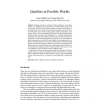Free Online Productivity Tools
i2Speak
i2Symbol
i2OCR
iTex2Img
iWeb2Print
iWeb2Shot
i2Type
iPdf2Split
iPdf2Merge
i2Bopomofo
i2Arabic
i2Style
i2Image
i2PDF
iLatex2Rtf
Sci2ools
111
click to vote
FOIS
2006
2006
Qualities in Possible Worlds
The paper analyzes how and under which assumptions it is possible to compare (in a relationist setting and relatively to qualities) entities living in different worlds. We begin with a standard technique to construct quality kinds via an abstraction process. In the first case, the process is applied across all the possible worlds and we show that the resulting quality system has problematic conseThen, we focus on the alternatives that arise when the abstraction process is applied within each single world independently, i.e., assuming similarity judgments make sense only when referring to entities living in the same world. This situation leads to worlds with unrelated quality systems and we look at the problem of quality comparison across worlds. We analyze under which assumptions this comparison is possible and discuss its limits by considering the structural information that one can infer from the elements shared by (two or more) overlapping worlds. Exploiting the use of such informat...
Related Content
| Added | 31 Oct 2010 |
| Updated | 31 Oct 2010 |
| Type | Conference |
| Year | 2006 |
| Where | FOIS |
| Authors | Stefano Borgo, Claudio Masolo |
Comments (0)

